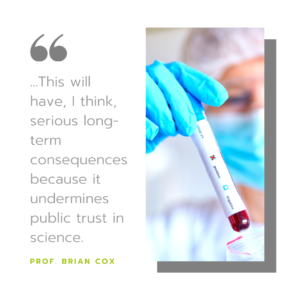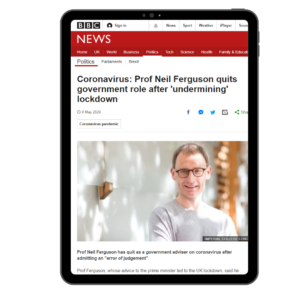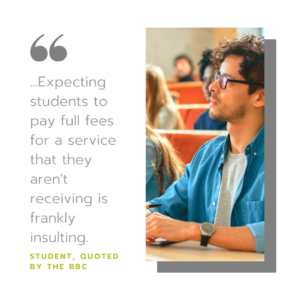Whilst universities have been able to generate positive profiles throughout the initial pandemic response, it has not inoculated them against criticism. In fact, academia is in the firing line when it comes to negativity.
Some of that has been within the sector, from staff and students, particularly from those affected directly by the way in which universities have had to respond quickly to changing external circumstances.
Shooting the messenger
However, the role of science and scientists has also come under scrutiny by the wider public as huge decisions affecting life and liberty have been made by governments referring constantly to ‘the best scientific advice’.
 Prof Brian Cox, the University of Manchester scientist – and speaker at the most recent World 100 conference – has said that politicians may be undermining public trust in science in the way they talk about it when defending their decisions. He said he was particularly concerned about ministers saying they are just “following the science”.
Prof Brian Cox, the University of Manchester scientist – and speaker at the most recent World 100 conference – has said that politicians may be undermining public trust in science in the way they talk about it when defending their decisions. He said he was particularly concerned about ministers saying they are just “following the science”.
“The politicisation of science or scientific advice might deliver some short-term political advantages,” he said. “It’s very tempting, I think, to blame the science if a decision is made which subsequently turns out to be suboptimal in some way. But, this will have, I think, serious long-term consequences because it undermines public trust in science.”
In Germany, the head of the German public health institute’s reference lab on coronaviruses, who has become a key government expert during the pandemic, describes receiving death threats. “For many Germans, I’m the evil guy who is crippling the economy,” said Christian Drosten, of the Institute of Virology at the Charité Hospital in Berlin.
In the UK, the extraordinary story of the treatment of a leading high-profile scientist has caused concern. Professor Neil Ferguson heads a modelling team at Imperial College London, and has been a key member of the board of scientists advising the government through the pandemic.
A model produced by his team in mid-March suggested high levels of deaths if additional measures to control the spread of the virus were not introduced. The UK Government subsequently introduced similar lockdown measures to elsewhere in the world, and Professor Ferguson was widely described in the media (inaccurately) as the man who forced the decision.
However, in early May, it was reported that Professor Ferguson had broken the lockdown measures himself, and he chose to resign from the government advisory position.
It was noted by many that the story of his indiscretions managed to bump headlines of the UK recording the highest numbers of deaths in Europe from many front-pages.
And what followed was a coordinated media campaign to discredit both Professor Ferguson and the science produced by his team, with strong follow-up on social media and in the right-wing media in the US in particular.
Imperial’s response has been to focus on the integrity of the scientific process. However a spokesman from the university’s COVID-19 response team could not resist a specific reference to the wider controversy, saying “We reject the partisan reviews of a few clearly ideologically motivated commentators.”
Whether there is any long-term impact of this saga on the reputation of Imperial, or indeed the sector more widely, is difficult to say. But the focus on both the scientist and subsequently the science itself was a reminder that whilst universities will undoubtedly be part of any solution to the pandemic, their roles are not uncontested.
Follow the Money
Elsewhere, academia has come under criticism for a wide variety of reasons, including taking government money as part of government responses to the financial effects of the pandemic.
In the US, Stanford University withdrew an application for $7.4 million of federal emergency funding based on its numbers of poorer students, whilst Harvard University rejected a $8.7 million payment, citing “intense focus from politicians”, the day after being sharply criticised by President Donald Trump.
Princeton, Yale, and The University of Pennsylvania subsequently fell into line, meaning the five wealthiest private universities with the largest endowments have all decided to forgo stimulus cash.
Meanwhile, in Australia, universities have been prevented from accessing a Government wage subsidy programme, meaning HE institutions now faced tougher eligibility requirements than even the biggest Australian businesses. The move was described as ‘an extra twist of the knife’ as the sector battles with Government for support.

In the UK, some commentators responded negatively to the sector’s vocal requests for a substantial bailout, one awarding the position taken by universities as ‘A first-class degree in greed and ineptitude‘.
Whilst criticism is perhaps unsurprising from long-term opponents of academia who see it as a key pillar of the liberal elite establishment, more concerning might be views of current students reflecting on the quality of education and support received during the lockdown.
The BBC quoted one as saying “Expecting students to pay full fees for a service that they aren’t receiving is frankly insulting,” he said. And a recent survey showed that half of students don’t think that the online learning provided since the lockdown is good enough.
Similar debates about universities and finance are going on in other parts of the world, and will no doubt continue to impact on reputation in the medium to long term as all sectors of society seek to ensure their survival and eventual recovery.
How should reputation managers respond?
Some of the recent negative developments have been a salutary lesson that issues management remains a key component of building reputation for global universities.
Experience from across the World 100 Reputation Network suggests some lessons in responding to criticism.
- First, do what communications professionals have always done: manage hostile enquiries calmly, transparently, and with patience. Descending into a public slanging match would be what some opponents want us to do. But equally, it is important to rebut falsehoods robustly.
- Second, given the all-encompassing nature of the crisis, it is important that universities work together to support the sector as a whole if it comes under attack. Of course, we are competitors, but collaboration is probably more important now than ever; and sharing experiences with colleagues, both nationally and globally, can help. The World 100 survey, Taking the Temperature of Covid-19 will be collecting reputation managers’ views throughout the crisis – click here to take the latest surveyh
- Finally, it is vital, alongside responding to external criticism, to prioritise engagement with our most important stakeholders, explaining our actions and being open to dialogue. If we are trusted by those with the highest stakes in our respective futures, our message will be heard.
We will be sharing more insights from colleagues around the world on responses to the pandemic through regular blogs, webinars, and social media. Share your experiences on the LinkedIn University Communications community.

